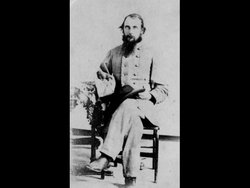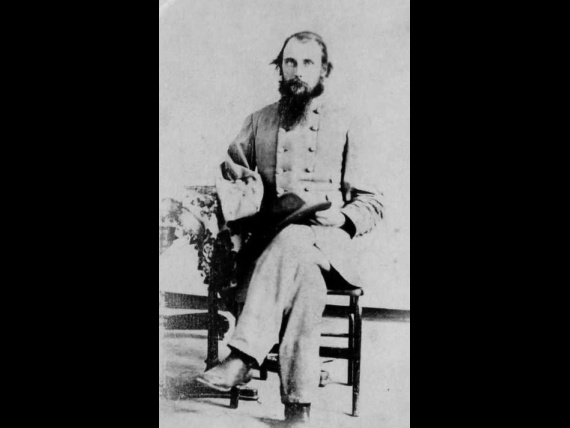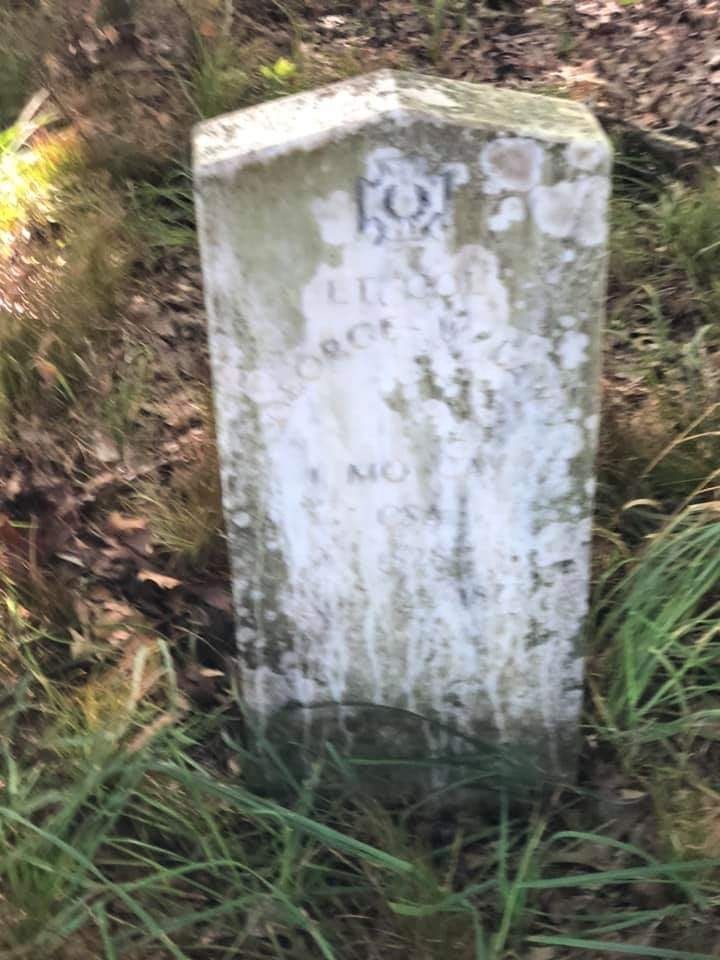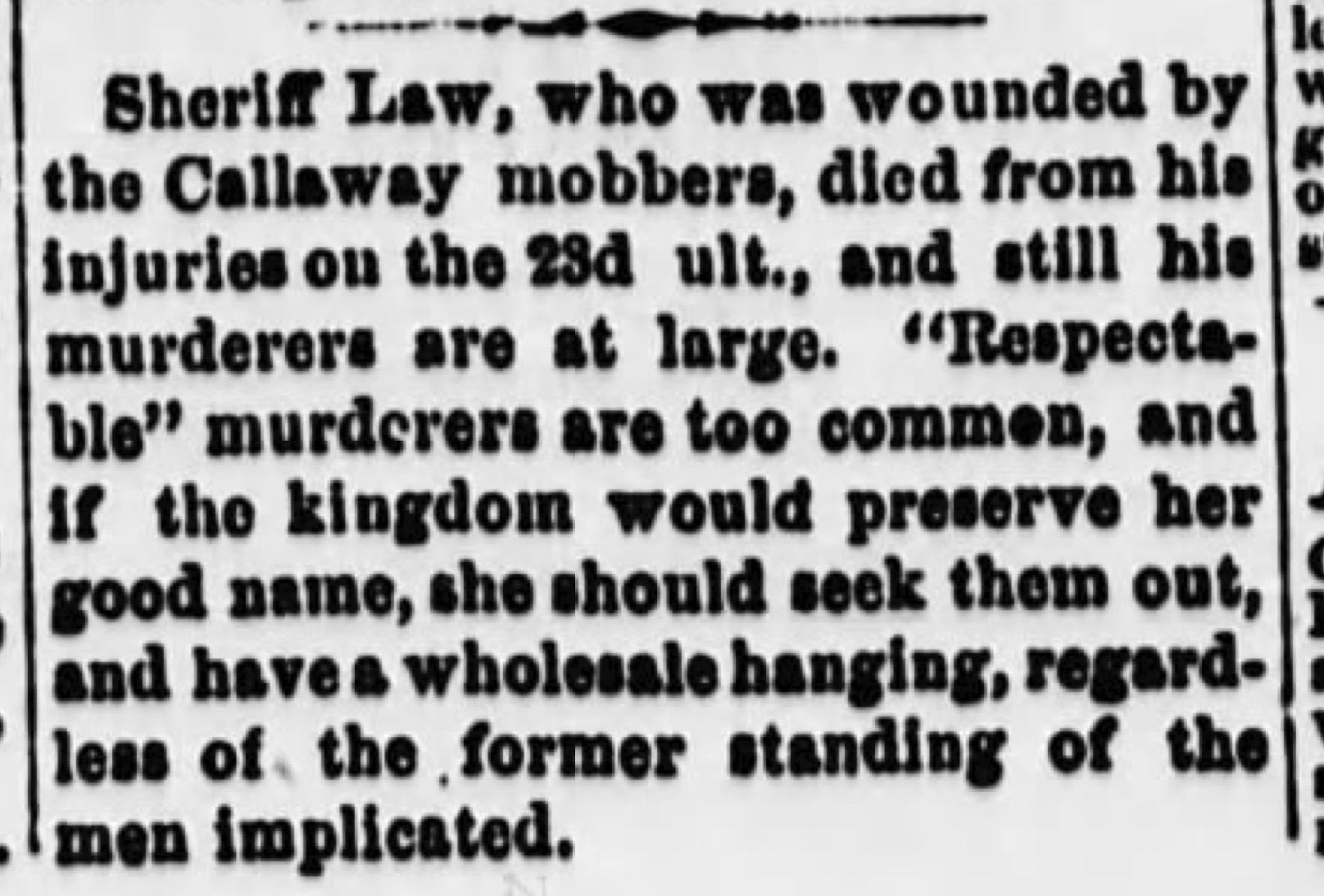He was the son of John W. and Mary B. Ferguson Law, born in 1828 in Franklin County, Virginia. The family emigrated to Callaway when he was young. He became a successful farmer, settling in the neighborhood of Reform. He and his wife Amanda had eleven children. When Amanda died May 26, 1871, eight of their children had gone before her.
As the Civil War began, Law joined the rebel Missouri State Militia that fought under Sterling Price. In December ten companies were enlisted and perfected into the 1st Missouri Calvary with Elijah Gates chosen commander and George Law as captain. By 1862 Law was a lieutenant colonel, still serving under Gates.
He was involved in the 1863 Vicksburg campaign. After defeat at Champion Hill on May 16, 1863 Confederate forces arrived at Big Black River Bridge early in the morning of the following day. Toward mid-morning Union forces moved upon them from the opposite side of the bridge and firing began. The Confederates withdrew to the far bank and set fire to the bridge and the steamboat Dot. During this maneuver, George Law received bullet wounds to the left arm. They reached Vicksburg later in the day. Law's wounds were such that amputation was necessary. When he had recovered he rejoined his unit and served until the final surrender, May 4, 1865.
In November of 1872 Law was elected sheriff of Callaway county. On June 19, 1873 he was notified that two horses had been stolen by the notorious horse thief Peter Kessler and his son Augustus. Five weeks later the two were arrested in St. Louis. By July 30 they had been taken to Jefferson City for imprisonment. There were threats of lynching. The prisoners were taken to Fulton August 1 and committed to the county jail. That night an angry mob appeared on the edge of town and was dispelled. Law took the Kesslers to a place safer than the tiny jail. The next day he returned them to Jefferson City.
Trial was set for August 15. The prisoners were put aboard the Louisiana & Missouri River Railroad. Just a few miles from the river, Augustus Kessler managed to escape from the window of the moving train. Law tightened security, met the train in Fulton and transported Kessler to trial. A reporter wrote, "Seeing from the temper of the crowd that danger was imminent and postponement would prove fatal [to Kessler], they concluded the best course would be to plead guilty," which is what was done. Kessler was sentenced to six years in the penitentiary.
He was kept in the courthouse for more than two hours, then placed in a closed carriage. With a complement of eight to ten mounted guards, the carriage pulled away. Immediately, the driver was pushed from his seat by an unidentified man who drove the carriage furiously up Court Street.
The driver turned and pointed his pistol at Kessler but Law kicked the pistol upward and it discharged through the roof. Simultaneously men on horseback rode up, firing rapidly into the carriage. The sheriff's guard provided heavy fire, but to no effect. Law was mortally wounded. One ball entered his left hip, another 6-8" above this which lodged in his spine. His deputy, W.W. Dundon was also mortally wounded.
The men endured a jarring ride of almost two miles before the carriage drew to a stop. A man who happened by managed to take them to Law's home in Fulton. Help arrived quickly. Editor John B. Williams wrote, "It was indeed a terrible scene; it has never been our lot to see men endure greater agony; but a large number of friends gathered..."
Law's suffering was borne with fortitude. His mind was clear until a few hours of his death. His good friend Col. Elijah Gates, now sheriff of Buchanan county, was summoned to the deathbed and provided great comfort in Law's last few hours. George Law died on August 23, 1873. He was buried at the cemetery that he, himself had established at his farm, next to his wife Amanda and surrounded by eight of their small children.
A crowd of almost one thousand had witnessed the ambush. No one ever came forward.
APJ
He was the son of John W. and Mary B. Ferguson Law, born in 1828 in Franklin County, Virginia. The family emigrated to Callaway when he was young. He became a successful farmer, settling in the neighborhood of Reform. He and his wife Amanda had eleven children. When Amanda died May 26, 1871, eight of their children had gone before her.
As the Civil War began, Law joined the rebel Missouri State Militia that fought under Sterling Price. In December ten companies were enlisted and perfected into the 1st Missouri Calvary with Elijah Gates chosen commander and George Law as captain. By 1862 Law was a lieutenant colonel, still serving under Gates.
He was involved in the 1863 Vicksburg campaign. After defeat at Champion Hill on May 16, 1863 Confederate forces arrived at Big Black River Bridge early in the morning of the following day. Toward mid-morning Union forces moved upon them from the opposite side of the bridge and firing began. The Confederates withdrew to the far bank and set fire to the bridge and the steamboat Dot. During this maneuver, George Law received bullet wounds to the left arm. They reached Vicksburg later in the day. Law's wounds were such that amputation was necessary. When he had recovered he rejoined his unit and served until the final surrender, May 4, 1865.
In November of 1872 Law was elected sheriff of Callaway county. On June 19, 1873 he was notified that two horses had been stolen by the notorious horse thief Peter Kessler and his son Augustus. Five weeks later the two were arrested in St. Louis. By July 30 they had been taken to Jefferson City for imprisonment. There were threats of lynching. The prisoners were taken to Fulton August 1 and committed to the county jail. That night an angry mob appeared on the edge of town and was dispelled. Law took the Kesslers to a place safer than the tiny jail. The next day he returned them to Jefferson City.
Trial was set for August 15. The prisoners were put aboard the Louisiana & Missouri River Railroad. Just a few miles from the river, Augustus Kessler managed to escape from the window of the moving train. Law tightened security, met the train in Fulton and transported Kessler to trial. A reporter wrote, "Seeing from the temper of the crowd that danger was imminent and postponement would prove fatal [to Kessler], they concluded the best course would be to plead guilty," which is what was done. Kessler was sentenced to six years in the penitentiary.
He was kept in the courthouse for more than two hours, then placed in a closed carriage. With a complement of eight to ten mounted guards, the carriage pulled away. Immediately, the driver was pushed from his seat by an unidentified man who drove the carriage furiously up Court Street.
The driver turned and pointed his pistol at Kessler but Law kicked the pistol upward and it discharged through the roof. Simultaneously men on horseback rode up, firing rapidly into the carriage. The sheriff's guard provided heavy fire, but to no effect. Law was mortally wounded. One ball entered his left hip, another 6-8" above this which lodged in his spine. His deputy, W.W. Dundon was also mortally wounded.
The men endured a jarring ride of almost two miles before the carriage drew to a stop. A man who happened by managed to take them to Law's home in Fulton. Help arrived quickly. Editor John B. Williams wrote, "It was indeed a terrible scene; it has never been our lot to see men endure greater agony; but a large number of friends gathered..."
Law's suffering was borne with fortitude. His mind was clear until a few hours of his death. His good friend Col. Elijah Gates, now sheriff of Buchanan county, was summoned to the deathbed and provided great comfort in Law's last few hours. George Law died on August 23, 1873. He was buried at the cemetery that he, himself had established at his farm, next to his wife Amanda and surrounded by eight of their small children.
A crowd of almost one thousand had witnessed the ambush. No one ever came forward.
APJ
Inscription
LT COL GEORGE W LAW 1 MO CAV CSA, 1828 - AUG 23 1873
SHERIFF OF CALLAWAY COUNTY / KILLED IN THE LINE OF DUTY
Gravesite Details
Marker placed December, 2000 by Elijah Gates Camp #570, Sons of Confederate Veterans
Family Members
Advertisement
Records on Ancestry
Advertisement








